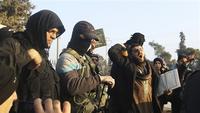-
Digital birth card to help Kenya fight terrorist infiltration
The influx of immigrants from neighboring African states includes Islamic militants, some belonging to terrorist group al-Shabaab. Maintaining proper records of every Kenyan and immigrant will offer authorities leads on who is in the country and potentially a threat to national security. Some suggests the adoption of a Digital Birth Card (DBC) as a way to curb Kenya’s terrorism fears.
-
-
Bioterrorism as a voter fraud mechanism
In the early 1980s, a guru named Bhagwan Shree Rajneesh and his hundreds of followers, called Rajneeshees, relocated from India to a 64,000-acre ranch in Wasco County, Oregon, a rural area of roughly 21,000 people at the time. Rajneesh’s plan to build more houses on the ranch to accommodate his followers was denied by county officials. Rajneesh had an idea: to win seats on the County Commission, the Rajneeshees decided to suppress non-Rajneeshees voters by poisoning thousands of residents with Salmonella prior to election day, and then recruit thousands of homeless people from nearby cities and offering them food if they voted for Rajneeshees-backed candidates.
-
-
Defense in terror case challenges exclusion from court session on surveillance records
The defense for Adel Daoud, a young Muslim man who was arrested outside a Chicago bar in an undercover FBI operation and charged with attempting to blow up the bar, has submitted a motion objecting to a private court session held to discuss the defense’s access to classified records. “Not only do I not get to be there, but I didn’t even get to object,” defense attorney Thomas Durkin said. “I had to object over the fact that I couldn’t even make an objection.”
-
-
Advancing microbial forensics to respond to global biological outbreaks
Much as human DNA can be used as evidence in criminal trials, genetic information about microorganisms can be analyzed to identify pathogens or other biological agents in the event of a suspicious disease outbreak. Biological outbreaks can include natural occurrences, accidental, or negligent releases from laboratories, biocrimes aimed at individuals or small groups, or acts of bioterrorism and biowarfare intended to affect large populations. The tools and methods used to investigate such outbreaks belong to an emerging discipline known as microbial forensics, but the field faces substantial scientific and technical challenges, says a new report.
-
-
States have consistently negotiated with terrorists to get back their citizens
The prisoner exchange with the Taliban has been met with criticism from some quarters, but, in fact, there is nothing unique about it, as the record shows that states around the world do negotiate with terrorists in order to get back their citizens or advance other goals. For example, since the early 1980s, Israel has freed nearly 8,000 Palestinian terrorists, and Palestinian and Arab prisoners, for fewer than twenty Israelis — soldiers and citizens who were held captive by Hezbolla and Hamas, and the bodies of several dead Israelis soldiers Hezbollah held as bargaining chips. Experts say that arguments can be made for or against theBergdahl exchange on its merits, but what cannot be argued is that the exchange should not have been made because it involved negotiations with terrorists.
-
-
Expatriate Jihadists operating in Syria explain views, alarm West

More than 3,000 Westerners — among them 70 Americans — are believed by intelligence and counterterrorism officials to have traveled to Syria to join the war against the government of president Bashar al-Assad. Many of them engaged in what they believe is a holy war. This increase in the number of expatriate jihadists has led to a more aggressive response by security officials. In Britain, the Home Office stripped more than twenty individuals of their citizenship, and in just the first three months of this year there was a spike of more than forty “Syria-related arrests.”
-
-
Growing Jihadist threat demands new U.S. strategy to combat terrorism: RAND study
There is a growing terrorist threat to the United States from a rising number of Salafi-jihadist groups overseas, according to a new RAND study. Since 2010, there has been a 58 percent increase in the number of jihadist groups, a doubling of jihadist fighters, and a tripling of attacks by al Qaeda affiliates. The most significant threat to the United States, the report concludes, comes from terrorist groups operating in Yemen, Syria, Afghanistan, and Pakistan. There is a medium-level threat from terrorist groups operating in Somalia, Iraq, Libya, Lebanon, Nigeria, and Algeria. There is also a low-level threat from Salafi-jihadist groups operating in such countries as Tunisia, Mali, and Morocco.
-
-
Floridian is first known American suicide bomber in Syria

Floridian resident Moner Mohammad Abusalha is the first known American suicide bomber in Syria’s civil war. His death last May came as a surprise to U.S. counterterrorism agencies, which had lost track of him once he entered Syria. Some 12,000 foreign fighters have so far taken part in the Syria civil war — 3,000 of them from Western countries — and the inability to track these foreign fighters reflects a troubling blind spot for Western intelligence agencies. U.S. intelligence services are further hampered by legal restrictions which limit the monitoring of U.S. citizens and their communications.
-
-
With massive presence of foreign fighters, Syrian conflict resembles 1980s Afghanistan war
A new report by the Soufan Groupestimates that in just three years, 12,000 foreign fighters have traveled to Syria to support various rebel groups fighting the government of President Bashar al-Assad. U.S. and Israeli intelligence previously estimated that there were 7,000 foreign fighters in Syria at the start of 2014. Security experts are comparing the situation to the influx of foreign fighters into 1980s Soviet-occupied Afghanistan, which saw 10,000 foreign fighters battle the Soviets in the decade-long conflict that spawned al-Qaeda.
-
-
House passes measure requiring review of intelligence sharing practices
In the bill is the first legislation written in response to shortcomings revealed by the Boston marathon bombings,the House of Representatives last Friday approved a measure which requires the FBI, DHS, and the Office of the Director of National Intelligence to review their information sharing practices and report back to Congress within ninety days. Post-bombing investigation concluded that had intelligence agencies shared information on Tamerlan Tsarnaev, one of the suspects in the Boston Marathon bombings, prior to the incident, local law enforcement authorities may have been able to monitor Tsarnaev’s actions.
-
-
Urgent need: Dirty bomb detection technology which does not rely on helium
It has taken 4.7 billion years for Earth to accumulate our helium reserves, but these reserves are dwindling at an alarming rate, and will be exhausted by around 2025. The supplies we have originated in the very slow radioactive alpha decay that occurs in rocks, and there is no chemical way to manufacture helium. The Department of Defense and other agencies use Helium-3 (He-3) to detect neutrons emanating from Special Nuclear Material (SNM) in order to counter the threat of nuclear-fueled explosives such as dirty bombs. Since the supply of He-3 is rapidly drying up, the Defense Threat Reduction Agency (DTRA) awarded a $2.8 million contract to Alion Science and Technology to develop a replacement technology which will detect neutrons without relying on He-3.
-
-
China implements airport-like security checks at crowded train stations
China’s terrorism problem is worsening as a growing Uighur-led Islamist militancy has emerged in response to the Chinese government’s tough stance on ethnic problems in the Uighur homeland of Xinjiang in west China. In response to the growing security risks, Beijing passengers are now subject to security checks before their train commute.
-
-
Scientists: immediate action required to address superbugs’ threat
Scientists warn that drug-resistant superbugs demand an immediate, serious response and that the steps required to plan for these pathogens were not properly taken in previous decades. “[A] world without effective antibiotics would be ‘deadly,’ with routine surgery, treatments for cancer and diabetes and organ transplants becoming impossible,” says one scientist. The scientists warn that if action is not taken immediately, the massive health gains made since Alexander Fleming’s discovery of penicillin in 1928 will be lost forever.
-
-
Scientists urge U.S. to do more to detect, prevent use of bioweapons
Carefully targeted biological weapons could be as dangerous as nuclear weapons, so the United States should invest more resources in developing technologies to detect them, scientists say. What is especially worrisome is that “The advent of modern molecular genetic technologies is making it increasingly feasible to engineer bioweapons,” says one expert. “It’s making people with even moderate skills able to create threats they couldn’t before.” There is another worry: “A high-tech bioweapon could cost only $1 million to build,” the expert adds. “That’s thousands of times cheaper than going nuclear. Iran’s centrifuges alone cost them billions.”
-
-
Preventing ethnic violence: Full integration or full separation
What if we could use science to understand, accurately predict, and ultimately avoid, ethnic violence? A new study argues that the key to peace is either completely to integrate or completely separate people based on cultural, linguistic, and ethnic differences.
-
More headlines
The long view
How Male Grievance Fuels Radicalization and Extremist Violence
Social extremism is evolving in reach and form. While traditional racial supremacy ideologies remain, contemporary movements are now often fueled by something more personal and emotionally resonant: male grievance.
